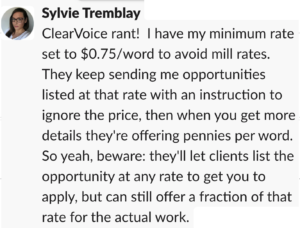The top 10 scams that target writers
Often freelance writers can be too trusting, as we seek to ply our trade. Sadly, there are plenty of people out there ready to take advantage of our trusting nature for their own gain.
1. Writing for free
There are many “opportunities” to write for free online. You’ll get a lot of pitches that your free piece will give you “great exposure.” Most of these offers are a complete waste of your time and energy.
The most common scam in this category is the request to write a free trial article as an audition for a job.
Unless you have no clips, you shouldn’t have to do this—prospects can just look at your samples and decide whether to hire you.
All too often, companies fill their content needs by simply asking applicants to do these “auditions.” These free samples are their whole source of content. They don’t really plan to hire anyone.
If you get asked to write a free sample, ask yourself if it’s worth your time. A good counter-offer is to write the piece on spec—namely, that if they use the clip you’ll be paid. If it’s good enough to publish, there’s no justifiable reason why your first piece should be unpaid.
2. Pennies for ad-clicks
Somewhat similar to Medium’s formula, you may find sites that offer an “opportunity” to write for what they promise will be pay. But the pay model is based on how often readers click on the ads next to your posts, or how many views a post gets.
Most of the sites making these offers have little traffic, so no clicks will happen. Also, have you noticed that people generally hate online ads? Real diminishing returns there, in general.
This is a formula that may have worked 15 years ago, but few sites today are good pay-per-click earning opportunities.
There is a legit way to earn based on traffic or ad clicks. That’s with a minimum-pay guarantee, with click or eyeball revenue figured in as a bonus. I earned well writing for Forbes on this formula at one point (sadly, their pay scheme is different now). Any site that really generates high traffic should be willing to offer you some base pay, since they know you’ll get some traffic. If they won’t pay a flat guaranteed fee in addition to click revenue, I recommend you move on.
3. Pay to play
This is one of the oldest scams out there. It’s so popular that the FTC warns against it. “Congratulations, your resume shows you are qualified for X contract job! Just pay the $30 application fee and you’ll be hired.” Nope. Total scam.
Legitimate employers don’t ask you to pay to apply or to get hired for their job. Nuh-uh.
Also, consider this gray area: the websites that promise you unique lists of freelance jobs, if you’ll pay a monthly subscription fee.
(Red flag: No samples will be offered, no free trial. No other benefits, just job lists.)
Heads up: Most of those job ads are simply scraped up from Craigslist and other places you could look at yourself, for free. And most of them pay about $20 per blog post.
When are job listings worth a fee?
A paid jobs list should be unique and high-quality. Shout-out to FlexJobs, which does an impressive job of digging up legit jobs off arcane places you’ll never find on your own.
A time-saving list of high-paying gigs is worth a fee, in my view. Most pay-to-play sites serve up warmed-over junk listings. Save your money, do your own research-and remember that online job ads are rarely a source of great freelance-writing jobs. That only comes from qualifying and pitching your own prospects, who aren’t sifting through 500 resumes from a mass job ad.
4. Follow the bouncing check
In these days of electronic fund transfers and PayPal, it’s fairly unusual for a client to want to send you a physical check or, even weirder, a money order or Western Union telegram. So if someone asks to pay you in one of these old-school ways, be on red alert. We’ve heard from writers who have turned in packages of 20 articles or more on the basis of an advance check, only to discover the check has bounced.
Another common rubber-check scam that targets writers involves sending you a fat, fake check for a lucrative-sounding upcoming writing assignment. It’s over $1 a word! You’re so excited, they’re paying so well. But after you deposit their check, they cancel part of the writing order and ask you to send the extra funds back.
Meanwhile, the check bounces. By the time your bank notifies you, you’ve mailed off $400 to your “client,” and they’re in the wind.
In another variation, the client tells you that special equipment or materials are required to do their writing job. (Say what!?) They will send you a check to cover this purchase, but urge you to go ahead and buy it now, so you can get started. You buy the needed items, which never arrive. You’ve wired your “reimbursement” to the client’s shadow company. By the time you start to wonder what’s up, their check has bounced.

Send me the guide
5. Imposter syndrome
No, I’m not talking about the self-esteem problem where you don’t feel worthy of earning a great living as a freelance writers. Here, I mean scammers who impersonate a name-brand company or thought leader in hopes of luring you into their scam.
One popular scam in this category involved people posing as executives at Mercer Consulting. They request Google Hangout-based text “interviews” to screen you.
Presto-you’re hired!
The only problem is that they’re imposters, leveraging a big-business name to suck you into a scam. Luckily, the writers I know have managed to pull out before finding out the details of how they were going to get exploited here. Likely, they would have turned in a big project, only to find the client in the wind.
Writers with high visibility online also get impersonated this way, by people running the next scam in our list. I know because it happened to me.
6. Man in the middle
When is a client not really a client? When they are a middleman inserting themselves into a transaction to steal a cut of your pay. Not talking about digital agencies that go out and hustle to sign clients and then hire writers to do their assignments. These are people who’ve done nothing to create the opportunity-they just want some money that should rightfully be yours.
This has been going on since the birth of the Internet. Here’s how it works: people who aren’t writers sign up on mass platforms such as Upwork, posing as writers. Then, they bid low on masses of gigs to scoop up as many listings as possible. Then, they offer to sub the work out to you, for even less money than the pittance that was offered originally. They pocket the difference.
I can document middleman scams targeting writers dating back to the days of Elance (remember them?)—that was the place where someone posed as me and then wanted to sub out work for a pittance.
When you talk to clients, make sure they are the client, not a middleman adding zero value. You get paid less in this scenario, and don’t get direct client contact. That means you’ve been robbed not just of some of your pay, but also of the career-making opportunity to get client recommendations and referrals.
7. Fake pricing scams
This is that new wrinkle I was telling you about. Apparently, some clients list high rates on their jobs when they post them to mass platforms-but there’s a catch.
If you see a note that says “ignore the price,” watch out. It turns out some platforms allow clients to post one price in their listing, but their fine print reveals the job actually pays pennies. This is a way of attracting better-quality writers who’ve set higher rates on the platform, and then hoping to sucker them into writing for less. Maybe you do a batch of work before noticing their real price is different than the one you saw.
Shout-out to freelance writer Sylvie Tremblay for alerting me to this scam, which she experienced on ClearVoice:

If you see a deceptively-priced listing, report it to the platform it’s on. Hopefully, we can keep the pressure on to get these posters banned.
8. Promotional scams
Marketing your writing is time-consuming work most of us hate. That’s why scams have proliferated that purport to find us clients or help sell our book. Some of the popular offers out there:
- Lead-finding platforms. Plenty of places claim they can drum up prospects for you…but I’ve heard zero success stories in my entire 25+ year writing career. There is no autopilot marketing algorithm that gets this done
- List sellers. They’ll claim to have a quality, up-to-date list of great prospects for you. But these lists are always a waste of money, with obsolete contact info. There is no list you can buy that will get you gigs-and you can easily build your own lead list with free online search
- Book promoters. They’ll claim to make your book into a guaranteed bestseller. But as my friend Linda Formichelli sadly found out, promoters can be sketchy and may not fulfill on their promises. Be skeptical and ask to talk to happy customers before paying others for legwork you could do on your own.
I wish there was a way to delegate our marketing done, but time has shown that in the freelance-marketing world, there’s no real substitute for marketing your own services. There’s no pre-built list or automated tool that can get us great clients. Build your network, build your audience, and sell your services. If you want help, carefully check references on anyone you bring on to help you promote.
The VA solution
There are routine parts of our marketing that can be delegated. What you can do is hire someone and give them parameters of who your client is, hand them your homemade prospect list, and get them to do the scut work of sitting and finding a contact name and email for each lead.
You can also write a marketing email pitch and have a VA sit and customize each one and send it out. Admin tasks can be farmed out, under your direction…but that’s about it.
9. Reputation destroyers
If you’ve worked as a journalist, you’ve probably been approached with an offer like this-we’ll pay you to write on the sites where you already have relationships. Please profile us as a great company. Quote our expert.
The catch: They don’t want you to tell your editor they’re paying you.
If you don’t know, this is unethical for journalists. It’s a conflict of interest. But increasingly, if they can land a link on Forbes.com or another high-traffic site with a great reputation, >marketing managers at struggling startups don’t care if they ruin your career.
Yes, it might well get you banned from that site, when the ruse is uncovered. And they don’t care.
The low-rent version of this reputation killer is the undisclosed, paid link-insertion request. A client just wants you to insert links to their site in posts you write on high-traffic, well-regarded sites-without telling your editor. They’ll throw $50 or $100 per link your way, for doing them this favor.
When your editor figures it out, you’ll be banned from their platform. Word gets around about writers with ethical challenges. It won’t ever be worth what they’re offering, when it could tank your career. Essentially, in this scenario you’re pretending you’re a journalist who’s independently found this company noteworthy. And it’s a lie.
If you’re starving this week, it might seem like easy money. I know writers who do this double-dipping, and think it’s no big deal-they’re willing to roll the dice on ruining their career. Trust me, it won’t be worth it. Just say no.
10. Writer education scams
Maybe I shouldn’t be saying this, as someone who offers 3-4 new courses every year. But there are a whole lot of sketchy course offers that target freelance writers. They make big promises and deliver little actual learning, teacher FaceTime, or earning potential for you.
What are the problems? Watch for:
